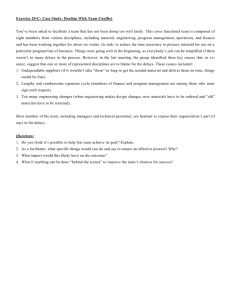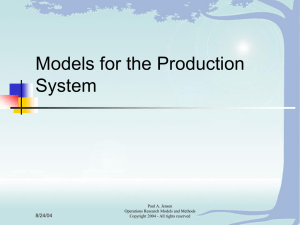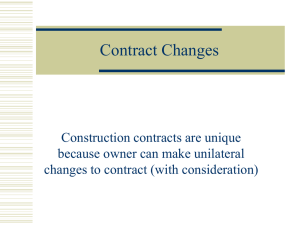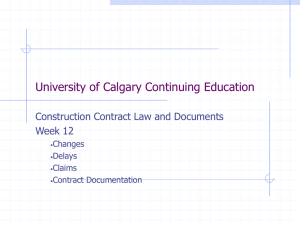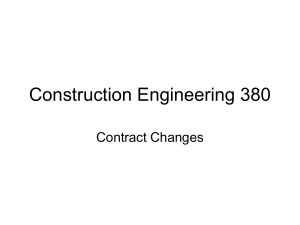Full Text - International Journal of Application or Innovation in
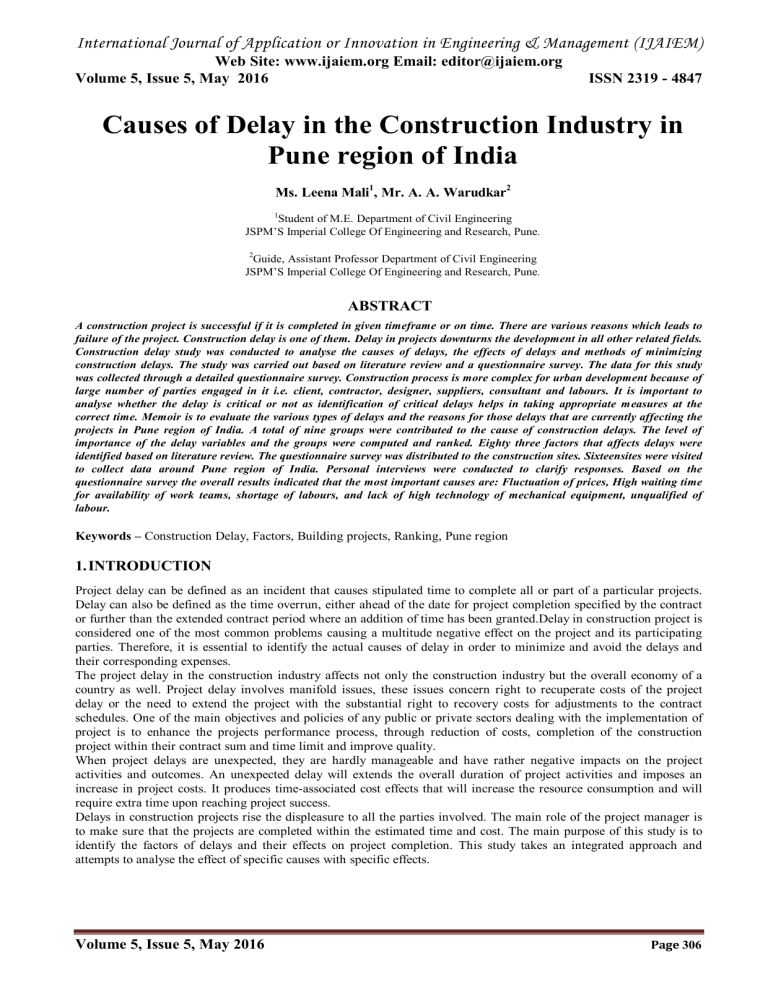
International Journal of Application or Innovation in Engineering & Management (IJAIEM)
Web Site: www.ijaiem.org Email: editor@ijaiem.org
Volume 5, Issue 5, May 2016 ISSN 2319 - 4847
Causes of Delay in the Construction Industry in
Pune region of India
Ms. Leena Mali
1
, Mr. A. A. Warudkar
2
1
Student of M.E. Department of Civil Engineering
JSPM’S Imperial College Of Engineering and Research, Pune .
2
Guide, Assistant Professor Department of Civil Engineering
JSPM’S Imperial College Of Engineering and Research, Pune .
ABSTRACT
A construction project is successful if it is completed in given timeframe or on time. There are various reasons which leads to failure of the project. Construction delay is one of them. Delay in projects downturns the development in all other related fields.
Construction delay study was conducted to analyse the causes of delays, the effects of delays and methods of minimizing construction delays. The study was carried out based on literature review and a questionnaire survey. The data for this study was collected through a detailed questionnaire survey. Construction process is more complex for urban development because of large number of parties engaged in it i.e. client, contractor, designer, suppliers, consultant and labours. It is important to analyse whether the delay is critical or not as identification of critical delays helps in taking appropriate measures at the correct time. Memoir is to evaluate the various types of delays and the reasons for those delays that are currently affecting the projects in Pune region of India. A total of nine groups were contributed to the cause of construction delays. The level of importance of the delay variables and the groups were computed and ranked. Eighty three factors that affects delays were identified based on literature review. The questionnaire survey was distributed to the construction sites. Sixteensites were visited to collect data around Pune region of India. Personal interviews were conducted to clarify responses. Based on the questionnaire survey the overall results indicated that the most important causes are: Fluctuation of prices, High waiting time for availability of work teams, shortage of labours, and lack of high technology of mechanical equipment, unqualified of labour.
Keywords – Construction Delay, Factors, Building projects, Ranking, Pune region
1.
INTRODUCTION
Project delay can be defined as an incident that causes stipulated time to complete all or part of a particular projects.
Delay can also be defined as the time overrun, either ahead of the date for project completion specified by the contract or further than the extended contract period where an addition of time has been granted.Delay in construction project is considered one of the most common problems causing a multitude negative effect on the project and its participating parties. Therefore, it is essential to identify the actual causes of delay in order to minimize and avoid the delays and their corresponding expenses.
The project delay in the construction industry affects not only the construction industry but the overall economy of a country as well. Project delay involves manifold issues, these issues concern right to recuperate costs of the project delay or the need to extend the project with the substantial right to recovery costs for adjustments to the contract schedules. One of the main objectives and policies of any public or private sectors dealing with the implementation of project is to enhance the projects performance process, through reduction of costs, completion of the construction project within their contract sum and time limit and improve quality.
When project delays are unexpected, they are hardly manageable and have rather negative impacts on the project activities and outcomes. An unexpected delay will extends the overall duration of project activities and imposes an increase in project costs. It produces time-associated cost effects that will increase the resource consumption and will require extra time upon reaching project success.
Delays in construction projects rise the displeasure to all the parties involved. The main role of the project manager is to make sure that the projects are completed within the estimated time and cost. The main purpose of this study is to identify the factors of delays and their effects on project completion. This study takes an integrated approach and attempts to analyse the effect of specific causes with specific effects.
Volume 5, Issue 5, May 2016 Page 306
International Journal of Application or Innovation in Engineering & Management (IJAIEM)
Web Site: www.ijaiem.org Email: editor@ijaiem.org
Volume 5, Issue 5, May 2016 ISSN 2319 - 4847
2.LITERATURE
REVIEW
1. Assaf, S. A., M. Al-Khalil, and M. Al-Hazmi(1995) “Causes of Delay In Large BuildingConstruction Projects”,
Journal of Management .In Engineering, Vol. 11, No. 2, pp. 45-50.
This paper has identified 56 main causes of delay in Saudi large building construction projects and their relative importance. A survey of contractors, owners, and architects/engineers was conducted on the causes of delay factors in large building projects in Saudi Arabia. The survey showed that all three groups generally agree on the ranking of individual delay factors. The factors were categorized into nine major groups and were ranked. The nine groups were material, manpower, equipment, financing, changes, government relations, scheduling and controlling, environment, and contractual relationships. Based on the contractors surveyed, the most important delay factors were:
1. Preparation and approval of shop drawings
2. Delays in contractor’s progress
3. Payment by owners and
4. Design changes
2. Kaming, P.F., Olomolaiye, P.O., Holt, G.D., and Harris, F.C. (1997) Factors influencing construction time and cost overruns on high rise projects in Indonesia. Journal of Construction Management and Economics, 15(1), 83-94.
Kaming (1997) carried out a research to study the impact factors on 31 high-rise projects in Indonesia and it was found that time overrun is less severe than cost overruns. The significant factors that lead to cost overrun are material fluctuation, inaccurate material estimation and degree of complexity. Whereas, design changes, poor labour productivity, inadequate planning, and resource shortages are marked as time overruns.
3. Mezher, T.M. and Tawil, W. (1998) Causes of delays in the construction industry in Lebanon. Engineering,
Construction and Architectural Management 5(3), 252-260.
Mezher & Tawil (1998) carried out a research in to find out the Causes of delays in the construction industry in
Lebanon. A total of 64 causes of delays were identified through research in which client, contractor and consultant were undertaken the study. All three parties generally agreed on the ranking of the major categories of delay factors. Owners had more concerns with regard to financial issues, while contractors ranked contractual relationships highest, and finally, consultants firms ranked project management highest. These causes were categorized in 10 main groups: materials, manpower, equipment, financing, changes, government relations, project management, site conditions, environment and contractual relationships.
4. Al-Momani, A.H. (2000).
Construction delay: a quantitative analysis, Journal of ProjectManagement18, 51-59.
Al-Momani investigated causes of delay in 130 public projects in Jordan. The main causes of delay were related to design, user changes, weather, site conditions, and late deliveries, economic conditions and increase in quantity. The study suggested that special attention to factors will help industry practitioners in minimizing contract disputes. Delays have strong relationship with failure and in effective performance of contractors.
5. Aibinu, A. A. and Jagboro, G. O. (2002).
The effects of Construction Delays on Project Delivery in Nigerian
Construction Industry. International Journal of Project Management, Elsevier, 20, 593-599.
Aibinu and Jagboro (2002) studied the effects of construction delays on project delivery in Nigerian construction industry. The six effects of delay that were identified includes: time overrun, cost overrun, dispute, arbitration, total abandonment and litigation.
6. Frimpong Y, Oluwoye J, Crawford L.
Causes of delay and cost overruns in construction of groundwater projects in a developing countries; Ghana as a case study. International Journal of Project Management 2003; 21:321–6.
Frimpong, conducted a survey to identify and evaluate the relative importance of significant factors contributing to delay and cost overruns in Ghana groundwater construction projects. A questionnaire with 26 factors was carefully designed from preliminary investigations conducted in groundwater drilling projects between 1970 and 1999 in Ghana.
The questionnaire was directed towards three groups in both public and private organizations: owners of the groundwater projects, consulting offices, and contractors working in the groundwater works. The questionnaire was distributed to a random sample of 55 owners, 40 contractors and 30 consultants. The result of the study revealed the main causes of delay and cost overruns in construction of groundwater projects: monthly payment difficulties from agencies; poor contractor management; material procurement; poor technical performance; and escalation of material prices.
Volume 5, Issue 5, May 2016 Page 307
International Journal of Application or Innovation in Engineering & Management (IJAIEM)
Web Site: www.ijaiem.org Email: editor@ijaiem.org
Volume 5, Issue 5, May 2016 ISSN 2319 - 4847
7. Koushki.P.A, Al-Rashid.K. andKartam. N. (2005).
Delays and Cost increase in the Construction of Private
Residential Projects in Kuwait. Journal of Construction Management and Economics, 23 (3), 285-294.
Regarding cost overrun Koushki (2005) identified three main causes that were contractor related problems, materialrelated problems, and owners, financial constraints, whereas Wiguna and Scott (2005) identified the most critical factors included: high inflation/increased material price, design change by client, defective design, weather conditions, delayed payment on contracts and defective construction work.
8. Assaf, S.A. and Al Hejji, S. (2006),“ Causes of delay in large construction projects”, International Journal of Project
Management, 24, 349-357.
Assaf and Al-Hejji (2006) studied the causes of delay in large building construction projects in Saudi Arabia. They found 73 factors that cause construction delays. They categorized these factors into 9 groups. Some of the most important causes of delay included approval of shop drawings, delays in contractors' payment by owners,design changes by owners, cash problems during construction, the slowness of the owners' decision-making process, design errors, excessive bureaucracy in project-owner organization, labour shortages and inadequate labour skills.
9. Murali Sambasivan, and Yau Wen Soon (2007)“ Causes and Effects of Delay in Malaysian Construction Industry”,
International Journal of Project Management, Vol. 25, pp. 517-526.
Murali Sambasivan, et al studied the delay factors and their impact on project completion in Malaysian construction industry. The study identified ten most important causes of delay from a list of 28 different causes. Ten most important causes of delay were:
1. Contractor’s improper planning
2. Contractor’s poor site management
3. Inadequate contractor experience
4. Inadequate client’s finance and payments for completed work
5. Problems with subcontractors
6. Shortage in material
7. Labour supply
8. Equipment availability and failure
9. Lack of communication between parties
10. Mistakes during the construction stage
10. Long, L.H., Lee, Y.D. and Lee, J. Y. (2008) Delay and Cost Overruns in Vietnam Large Construction Projects: A
Comparison with Other Selected Countries. Journal of Civil Engineering, 12(6), 367-377.
Long (2008) conducted a study to find out the cause of delays and cost overrun in Vietnam and 7 critical factors were identified such as, Slowness and Lack of constraint; Incompetence; Design; Market and Estimate; Financial capability;
Government; and Worker.
3.PROBLEM
STATEMENT
Failure to achieve targeted time, budgeted cost, designer changes or errors, weather, late deliveries and specified quality result in various unexpected negative effects on the projects. These are the reason that delay occur. Normally, when the projects are delayed, they are either extended or accelerated and therefore affects additional cost. In additional, the increasing of the oil price world, give the impact to the construction project. The cost for the construction also will increase because the price to buy the material and to pay the labour salary will increase too.If the situation is left and untreated, it will lead to more serious problems in the future upcoming construction project in India.
Scope Of Study -
The scope of the study will cover the construction project in Pune. This study is needed to evaluate the level of understanding and applying these delay concepts in planning, design and field operation. The questionnaire will be distribute to the management team include site engineer, project manager, safety officer, supervisor and others.
Significant Of Research -
To study the factor that cause delay in construction project and produce the statistical result. The result of the study will be the guideline to the parties that involve, so that it will avoid any source that will happen in their project. To suggest several factors that can avoid the delay in construction project may reduce the risk of delay in construction project.
Volume 5, Issue 5, May 2016 Page 308
International Journal of Application or Innovation in Engineering & Management (IJAIEM)
Web Site: www.ijaiem.org Email: editor@ijaiem.org
Volume 5, Issue 5, May 2016 ISSN 2319 - 4847
4.TYPES
OF DELAYS
The type of delay can also have an impact activities which need a more detailed analysis to determine whether additional time extension is warranted or not. There are four basic ways to categorize type of delays:
4.1. Critical or noncritical
4.2. Excusable or non-excusable
4.2.1. Excusable delay with compensation
4.2.2. Excusable delay without compensation
4.2.3. Non-excusable delay
4.3. Compensable or non-compensable
4.4. Concurrent or non-concurrent
4.1. Critical or Non-Critical Delays
Delays that affect the project completion, or in some cases a milestone date, are considered as critical delays, and delays that do not affect the project completion, or a milestone date, are noncritical delays. If these activities are delayed, the project completion date or a milestone date will be delayed. The determining which activities truly control the project completion date depends on the following:
The project itself
The contractor’s plan and schedule (particularly the critical path)
The requirement of the contract for sequence and phasing
The physical constraint of the project, i.e. how to build the job from a practical perspective
4.2. Excusable or non-excusable Delays
4.2.1 Excusable Delay with Compensation
Excusable with compensation are caused by the client's actions or inactions. When contractors encounter this type of delay, they are entitled to time extension as well as monetary compensation due to the delays. An example of an excusable delay with compensation would be when an owner denies access to the site once the notice toproceed is given. This delay is because come sometime unexpected situation and it not from mistake of the contractor. The external factor is something hard to make sure because it refer to the future and event.
4.2.2 Excusable Delay without Compensation
Excusable without compensation are delays where neither the client nor the contractor is deemed responsible. When this type of delay is encountered, only a time extension will be warranted since there are no grounds for damages This delay is allow to the extends of time to finish construction without give any compensation to the contractor. The factor that include of this delay is: i. Protest from the labour ii. Unexpected whether iii. Unexpected of late delivery equipment iv. Unexpected of late delivery material
4.2.3 Non-Excusable Delay
This delay cause by avoid the contract agreement by contractor and itwas identify by construction contract. Client can claim their loss if had in the contract agreement. These delay had to identify by client because they rarely to check the schedule of the construction. The factor that contribute to the non-excusable delay: i. The usual weather and as expected whether ii. Delay cause by subcontractor iii. The inefficiency of contractor to manage the construction site. iv. The financial of contractor. v. The lack of labour. vi. Failure to manage their work according to the contract schedule. vii. Always make mistake or failure to fulfil of owner specification
Volume 5, Issue 5, May 2016 Page 309
International Journal of Application or Innovation in Engineering & Management (IJAIEM)
Web Site: www.ijaiem.org Email: editor@ijaiem.org
Volume 5, Issue 5, May 2016 ISSN 2319 - 4847
4.3. Compensable Delays or Non-Compensable Delays
A compensable delay is a delay where the contractor is entitled to a time extension and to additional compensation.
Relating back to the excusable and non-excusable delays, only excusable delays can be compensable. Non-compensable delays mean that although an excusable delay may have occurred, the contractor is not entitled to any added compensation resulting from the excusable delay. Thus, the question of whether a delay is compensable must be answered.
Whether or not a delay is compensable depends primarily on the terms of the contract. In the most cases, a contract specifically notes the kinds of delays that are non-compensable, for which the contractor does not receive any additional money but may be allowed a time extension.
4.4. Concurrent Delays
The concept of concurrent delay has become a very common presentation as part of some analysis of construction delays. The concurrency argument is not just from the standpoint of determining the project’s critical delays but from the standpoint of assigning responsibility for damages associated with delays to the critical path. Owners will often cite concurrent delays by the contractor as a reason for issuing a time extension without additional compensation.
Contractors will often cite concurrent delays by the owner as a reason why liquidated damages should not be assessed for its delays. Unfortunately, few contract specifications include a definition of concurrent delay and how concurrent delays affect a contractor’s entitlement to additional compensation for time extension or responsibility for liquidated damages.
In analysed concurrent delays, each delay is assessed separately and its impact on other activities and the project duration is calculated. There are some guidelines for concurrent delays classification. Firstly, if excusable and nonexcusable delays occur concurrently, only a time extension is granted to the contractor. Next, if excusable with compensation and excusable without compensation delays occur concurrently, the contractor is entitled to time extension, but not to damages.
5.CAUSES
OF DELAY
Total 83 causes of construction project delays were identifies from literature or pilot study. Pune is the most industrialised city, thus most construction and consulting companies locate their administrative offices in this city. The survey is based on 16 well recognised construction sites, 60-65 causes are applicable for this region. Causes of delay to which participants were asked to indicate their level of importance of each cause. These causes were categories into following 9 major groups.
1.
Project related factors includes contract duration, legal disputes between various parties, type of project bidding, ineffective delay penalties.
2.
Client related factors includes finance and payments of completed work, owner interference, slow decision making and unrealistic contract duration imposed by owners.
3.
Contractor related factors includes site management, improper planning, contractor experience, mistakes during construction, and improper construction methods by subcontractors. Contractors are fully responsible for delays cause by subcontractor, because subcontractor included among contractor’s factors.
4.
Consultant related factors includes experience of consultant, inspection and testing.
5.
Designer or consultant related factors includes preparation and approval of drawings, quality assurance or control.
6.
Material factors include late procurement of material, shortage of material.
7.
Equipment related factors includes equipment availability, shortage of equipment, low level equipment operators.
8.
Labour related factors includes shortage, personal conflict, weak motivation, labour productivity.
9.
External related factors includes natural disasters, effect of subsurface conditions, traffic control and restriction, provide service from utilities, market inflation.
6.EFFECTS
OF DELAYS
Time overrun - When the stipulated completion time is pushed forward, the project is said to have experienced time overrun.
Budget overrun - When a project is completed at a cost higher than what was budgeted, it is said to experience a budget overrun.
Poor quality completed project- As highlighted in the previous section inferior workmanship and/or inferior quality materials, can lead to issues of project quality.
Litigation - Disputes can lead to court cases for resolution especially when large penalties are at stake.
Volume 5, Issue 5, May 2016 Page 310
International Journal of Application or Innovation in Engineering & Management (IJAIEM)
Web Site: www.ijaiem.org Email: editor@ijaiem.org
Volume 5, Issue 5, May 2016 ISSN 2319 - 4847
Arbitration - The cost and time related to the engagement of professional arbitrators.
Disputes and claims- Disputes and claims arise against for the losses incurred through delays.
7.METHODOLOGY here are two methods involves in this process. The first method consisted of literature search for information on causes of delay in other countries. Second method is to identify critical attributes among all nine categories by taking interviews of several sites. To identify most critical factors on the base of ‘Relative Importance Index’ (R.I.I.).
This phase resulted in the identification of top ten causes of delay. This stage involved the development of questionnaire incorporating the causes of delay identified and data collection. The questionnaire was organised in the form of an importance scale. Respondents, were asked to indicate by ticking a column the relative importance of each of the causes of construction delay (in terms of 4 = ‘Always’, 3 = ‘Often’, 2 = ‘Sometimes important’, 1 = ‘Rarely’).
Relative Importance Index (RII) –
RII = ∑ W / A × N (1)
W =Weighting given to each factor by respondents
A = Highest weightage is 4
N = Total number of respondent are 16
General structure of proposed system
Fig 1 General structure of proposed system
8.SIGNIFICANT
CAUSES OF DELAY
Importance index was employed to rank the significant causes of delay. All the parties contributed to rank the significant factors of delays. The result in Table 1. shows that the top 10 major causes of construction delays in pune,
Maharashtra, India are shortage of labours rank of 0.797 and lack of high technology of mechanical equipment with importance rank of 0.766 followed by site mobilization, permits from municipality, poor qualification of contractor’s technical staff, delay in manufacturing building materials, providing services from utilities (water and electricity etc.) damage of sorted materials.
Volume 5, Issue 5, May 2016 Page 311
International Journal of Application or Innovation in Engineering & Management (IJAIEM)
Web Site: www.ijaiem.org Email: editor@ijaiem.org
Volume 5, Issue 5, May 2016 ISSN 2319 - 4847
Table 1 .Significant causes of delay
Causes of Delay
Index
Degree of severity
Rank
Shortage of labours 0.797 1
Lack of high technology of mechanical equipment
Delay site mobilization
0.766
0.750
2
3
Poor qualification of the contractor’s technical staff
Providing services from utilities
Late procurement of material
Late in reviewing and approving design
Unqualified workforce
Damage of sorted materials
Frequent change of subcontractor
0.719
0.703
0.672
0.672
0.656
0.656
0.656
8
9
10
6
7
4
5
9.CONCLUSION
AND RECOMMENDATION
Conclusion
The survey results indicated that the majority of delay factors are relevant to shortage of labours, lack of high technology of mechanical equipment, site mobilization. Most factors related to consultant it is due to not understanding the client necessities, not having proper project information, absence of some detail in drawing etc. In other factors due to which delay occurs are project conditions like providing services from utilities (water and electricity), complication in work due to weather. Delay also occurs due to external factor like change in government, regulation and location, unqualified of labours etc. The all ranking indices explained earlier were used to rank delay causes from viewpoints of the nine groups. Total 16 respondents participated in this survey. Top 10 causes ranked by Relative Importance Index
(RII) technique. The relative importance index, RII, was computed for each cause to identify the most significant causes. The causes were ranked based on RII values. From the ranking assigned to each cause of delays.
R ECOMMENDATION
To minimize and control delays in construction projects, the some issues can be recommended by all parties: Improve the knowledge and skills of technical staff and improve site management and supervision to achieve completion of work within specified time.
R
EFERENCES
[1] Assaf, S. A., M. Al-Khalil, and M. Al-Hazmi (1995) “Causes of Delay in Large Building Construction Projects”,
Journal of Management .In Engineering, Vol. 11, No. 2, pp. 45-50.
[2] Kaming, P.F., Olomolaiye, P.O., Holt, G.D., and Harris, F.C. (1997) Factors influencing construction time and cost overruns on high rise projects in Indonesia. Journal of Construction Management and Economics, 15(1), 83-
94
[3] Mezher, T.M. and Tawil, W. (1998) Causes of delays in the construction industry in Lebanon. Engineering,
Construction and Architectural Management 5(3), 252-260.
[4] Al-Momani, A.H. (2000).Construction delay: a quantitative analysis, Journal of ProjectManagement18, 51-59.
[5] Aibinu, A. A. and Jagboro, G. O. (2002). The effects of Construction Delays on Project Delivery in Nigerian
Construction Industry. International Journal of Project Management, Elsevier, 20, 593-599.
Volume 5, Issue 5, May 2016 Page 312
International Journal of Application or Innovation in Engineering & Management (IJAIEM)
Web Site: www.ijaiem.org Email: editor@ijaiem.org
Volume 5, Issue 5, May 2016 ISSN 2319 - 4847
[6] Frimpong Y, Oluwoye J, Crawford L. Causes of delay and cost overruns in construction of groundwater projects in a developing countries; Ghana as a case study. International Journal of Project Management 2003; 21:321–6.
[7] Koushki.P.A, Al-Rashid.K and Kartam.N. (2005). Delays and Cost increase in the Construction of Private
Residential Projects in Kuwait. Journal of Construction Management and Economics, 23 (3), 285-294.
[8] Assaf, S.A. and Al Hejji, S. (2006). Causes of delay in large construction projects. International Journal of Project
Management, 24, 349-357.
[9] Murali Sambasivan, and Yau Wen Soon (2007). “Causes and Effects of Delay in Malaysian Construction
Industry”, International Journal of Project Management, Vol. 25, pp. 517-526.
[10] Long, L.H., Lee, Y.D. and Lee, J. Y. (2008) Delay and Cost Overruns in Vietnam Large Construction Projects: A
Comparison with Other Selected Countries. Journal of Civil Engineering, 12(6), 367-377.
[11] Ghulam Abbas Niazai and Kassim Gidado (2009). Causes of Project Delay in the Construction Industry in
Afghanistan.pp.12-15.
Volume 5, Issue 5, May 2016 Page 313
